Non-Fullerene Acceptors
Non-fullerene acceptors (NFAs) are a promising alternative to fullerene-based electron acceptors. With a greater degree of flexibility to tune the optical properties and electronic energy levels, ITIC based organic solar cells offer greater thermal and photochemical stability, longer device lifetimes, and higher power conversion efficiencies.
Easy Synthesis
NFAs provide easy synthesis with the possibility to tune energy levels, unlike fullerenes
Strong Absorption
When compared to fullerenes, NFAs have strong absorption in the visible region and good thermal stability
Improved Stability
Non-fullerene materials improve stability of bulk heterojunctions structural morphology
We supply a range of the most promising n-type non-fullerene acceptors including the benchmark acceptors ITIC and Y6, alongside a collection of intermediates and NFA monomers for the synthesis of ITIC non-fullerene acceptors. Maximize your device efficiency by fabricating and testing new devices in a glove box environment.
Jump to: Browse NFAs | HOMO and LUMO of NFAs | Choose your OPV Device Structure | Resources and Support
Browse Non-Fullerene Acceptors
Related categories: fullerene acceptors, small molecule OPV donors, monomers
Filter by series:
Filter by LUMO (eV):
Filter by HOMO (eV):
HOMO and LUMO of NFAs
The HOMO and LUMO of non-fullerene acceptors are crucial factors when selecting components for an electronic device. Molecular engineering of NFAs has allowed a range of LUMO energy levels to be accessed in order to be better matched with a donor material. See the figures below for the (literature) reported HOMO and LUMO levels for our NFAs:
Choose your OPV device structure
A huge variety of NFAs have been developed for optoelectronic applications. Most are used in organic solar cell devices. Selecting the right combination of non-fullerene acceptor and polymer donor is crucial for maximizing device efficiency. See some example devices below for some inspiration and get in contact with our experts if you have any questions.
| Type | NFA | Polymer | VOC (V) | JSC (mA cm-2) | FF | PCE (%) | Reference |
| Indoor (IOPV) | IO-4Cl | PM6 | 1.09 | 0.0738 | 0.815 | 26.4 | |
| Ternary | L8-BO/L8-ThCl | D18 | 0.91 | 27.5 | 0.803 | 20.1 | |
| L8-BO | PM6:D18 | 0.896 | 26.7 | 0.819 | 19.6 | ||
| eC9-2Cl:F-BTA3 | PBQx-TF | 0.879 | 26.7 | 0.809 | 18.99 | ||
| L8-BO:BTP-eC9 | PM6 | 0.88 | 27.68 | 0.775 | 18.92 | ||
| N3:PCBM | D18-Cl | 0.849 | 28.22 | 0.78 | 18.69 | ||
| BTP-eC9:IT-4F | PM6 | 0.856 | 26.46 | 0.765 | 18.2 | ||
| IEICO-4F:BIT-4F-T | PTB7-Th | 0.723 | 27.3 | 0.709 | 14 | ||
| Binary | L8-BO | PM6 | 0.874 | 25.72 | 0.815 | 18.32 | |
| BTP-eC9 | PM6 | 0.839 | 26.2 | 0.811 | 17.8 | ||
| TPT10 | PTQ11 | 0.88 | 24.79 | 0.748 | 16.32 | ||
| Y6 | PM6 | 0.83 | 25.3 | 0.748 | 15.7 | ||
| IT-4F | PM6 | 0.87 | 20.38 | 0.77 | 13.7 | ||
| IT-4Cl | PM6 | 0.79 | 22.67 | 0.752 | 13.45 | ||
| ITIC | PBDB-T | 0.9 | 16.8 | 0.742 | 11.32 | ||
| ZY-4Cl | P3HT | 0.9 | 16.7 | 0.68 | 10.17 |
References
- Wide-gap non-fullerene acceptor enabling high-performance organic photovoltaic cells..., Cui, Y. et al., Nat Energy (2019)
- Molecular interaction induced dual fibrils towards organic solar..., Chen, C. et al., Nat Commun (2024)
- Single-junction organic solar cells with over 19% efficiency..., Zhu, L. et al., Nat. Mater. (2022)
- Single-Junction Organic Photovoltaic Cell with 19% Efficiency, Cui, Y., Advanced Materials (2021)
- Over 18.7% efficiency for bulk heterojunction and pseudo-planar..., Zhang, Z. et al., J. Mater. Chem. A (2024)
More on Non-Fullerene Acceptors

The discovery of ITIC in 2015 brought about the first serious challenge to the role of fullerenes as acceptors in polymer solar cells. To a large extent, they have already taken the spotlight away from fullerenes like PCBM as the preferred acceptor in bulk-heterojunction organic solar cells (OSCs).
The performance of NFA-based devices has now overtaken that of their fullerene-based cousins, with recent non-fullerene organic solar cells (NFOSCs) reaching power conversion efficiencies of over 17%. More research is needed before devices can be created with efficiencies that rival those of inorganic devices, but with the development of new non-fullerene acceptor materials, the first OPV cells with efficiencies in excess of 20% could be on the horizon.
Resources and Support
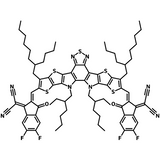 What are Non-Fullerene Acceptors?
What are Non-Fullerene Acceptors?
Non-fullerene acceptors (NFAs) are organic molecules that, like fullerenes, act as electron acceptors in organic solar cells and other organic electronic devices. However, unlike fullerenes, NFAs lack the hollow cage structure and offer greater flexibility in molecular design, allowing for tunable electronic and optical properties.
Read more...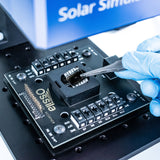 Application of Non-Fullerene Acceptors in Organic Solar Cells
Application of Non-Fullerene Acceptors in Organic Solar Cells
Non-fullerene acceptor (NFA) molecules are currently being used in the active layer of organic solar cells to enhance their efficiency. Organic solar cells, also known as organic photovoltaics (OPVs), consist of several organic components, each playing a distinct role in capturing solar energy.
Read more...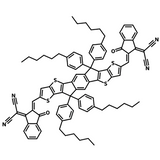 ITIC & Derivatives as OPV Acceptors
ITIC & Derivatives as OPV Acceptors
Of the significant efforts in research devoted to NFAs, the proposal of the fused-ring system ITIC in 2015 has generated the most success. In the initial paper proposing ITIC, a power conversion efficiency (PCE) of 6.80% was achieved in combination with a PTB7-TH donor.
Read more...In photovoltaics, researchers are constantly seeking better materials for organic solar cells (OPV). One standout example is Y6, a non-fullerene acceptor (NFA) that is an n-type organic semiconductor. Y6 is commonly paired with a polymer donor in bulk heterojunction solar cells.
Read more...Small molecules such as non-fullerene acceptors are showing significant promise for application in organic photovoltaics (OPVs). Like OPV polymers, they have tunable properties such as band-gap width.
Read more... Fullerene vs Non-Fullerene Acceptors for OPVs
Fullerene vs Non-Fullerene Acceptors for OPVs
Fullerene and non-fullerene acceptors play a pivotal role in organic photovoltaics (OPVs). OPVs are promising candidates for next-generation solar cells due to their lightweight, flexibility, and potential for low-cost production.
Read more...More on Organic Solar Cells
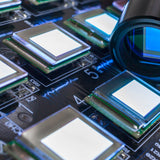 Organic Solar Cells: An Introduction to Organic Photovoltaics
Organic Solar Cells: An Introduction to Organic Photovoltaics
Organic solar cells, also known as photovoltaics (OPVs), have become widely recognized for their many promising qualities. This page introduces the topic of OPVs, how they work and their development.
Read more...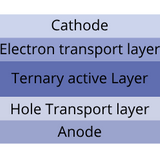 An Introduction to Ternary Organic Solar Cells
An Introduction to Ternary Organic Solar Cells
The majority of organic photovoltaics (OPVs) in research are based upon a binary active-layer mixture (of donor and acceptor materials) in the form of a bulk heterojunction (BHJ). Ternary organic solar cells extend this principle to three-component active layers, typically in the form of two donors and one acceptor, or one acceptor and two donors.
Read more..."Layer-by-layer" (LbL) processing, also known as "layer-by-layer" deposition, is a technique used for the fabrication of photovoltaic solar cells, in particular organic solar cells. This method involves the sequential addition of ultra-thin layers of materials to build up the device's structure.
Read more...































